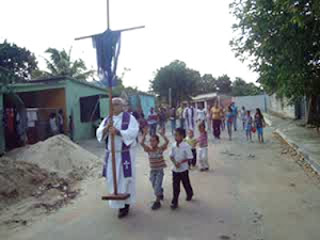“Whoever does not bear his own cross
and come after me cannot be my disciple.” Luke 14:27
It would have been more fitting to
have had the procession of the Cross on Palm Sunday. However, our
visitors from Barquisimeto were not due to arrive until the following
day, so it became part of the opening worship for our three-day
regional retreat for preteens on Monday.
We had the cross made for the
processional. It is a plain, wooden cross three meters in height
(that's an inch and a fraction short of 10 feet). I carried it in
front of the group as we marched around Barrio Las Lomas, singing
hymns. The cross did not seem so heavy at first, but my arms and
shoulders were aching at the end of the trail.
The Ark of the Covenant, symbol of the
promises God made to Israel at Mount Sinai, was solemnly carried in
front of the people of Israel as they crossed the Jordan River into
the Promised Land (Joshua, chapters 3 and 4) and also before the
people in a march around the city of Jericho (Joshua 6). When King
Solomon had built the first Temple of Jerusalem, the ark was carried
in solemn procession into the innermost part. Processions of the
cross reflect
this Old Testament imagery.
Christians
began marching in the streets behind a processional cross in the
fourth century A.D., when such demonstrations became tolerated in the
Roman Empire. The processions moved from church to church, with
participants, alternately saying or singing prayers, psalms, and
litanies.
Your gates shall be open
continually;
day and night they shall not be shut,
that people may bring to you the wealth of the nations, with their kings led in procession.
day and night they shall not be shut,
that people may bring to you the wealth of the nations, with their kings led in procession.
Also 2 Corinthians 2:14:
But thanks be to God, who in Christ always leads us in triumphal procession, and through us spreads the
fragrance of the knowledge of him everywhere.
Processions of the cross, with either a
plain cross or a crucifix, also have a
long and honorable history in Lutheranism. The Reformers objected
specifically to the Corpus Christi procession, because it involved
actual public display and adoration of the host (communion bread).
They did not, however, object to the idea of a procession of the
Cross. Many Lutheran churches have never abandoned the practice of
processionals, especially on festival days. For it is a principle of
our confession that the practices of the ancient church, if they do
not conflict with the clear teaching of Scripture, should be
preserved to every extent possible.
In Venezuela, of course, one must walk
a certain fine line. On the one hand, many of the
evangelical/pentecostal sects here consider even the display of a
plain cross to be too “papist”.It is not our intention to give
offense, or create a stumbling-block for the faith of these people
(per 1 Corinthians 8:13), but for Lutherans this position is
completely unacceptable. The cross, and not just the unadorned cross,
but especially the crucifix, is the central symbol of the faith, the
visual expression of what itś all about. We call our theology the
“theology of the cross”, because Christ's suffering and death on
the cross was His victory and ours. He atoned for our sins on the
cross and thus gained for us the hope of eternal life. Certainly, “if
Christ has not been raised, your faith is futile and you are still in
your sins” (1 Corinthians 15:17), but to celebrate Easter without
Good Friday is to preach a gospel of “cheap grace,” of salvation
without atonement.
On the other hand, in popular Roman
Catholic piety here (as elsewhere in the world), people often will
pray to the image of the Crucified. Thus, to avoid tempting anyone to
the sin of idolatry, we chose a plain cross for our procession.

Fun for preteens of all ages
Our guests during the first three days
of Holy Week included Miguelangel Perez, pastor of El Paraiso
Lutheran Church in Barquisimeto, and Sandra Lopez, Katharina Ramones
and two young girls from Nueva Vida Lutheran Mission in Barquisimeto.
The rest of the children attending the retreat were from our
neighborhood in La Caramuca. Total attendance was around 50 people.
Tuesday was devoted to Bible study and
activities reminiscent of vacation Bible school. The theme of the
retreat was “Timothy: A Good Soldier of Christ Jesus” with
special emphasis on 2 Timothy, chapter 3, verse 15:
“And how from childhood you have been
acquainted with the sacred writings, which are able to make you wise
for salvation through faith in Christ Jesus.”
Wednesday's event was an outing to the
Paguey River. The people from Barquisimeto had all returned home by
end of day Wednesday, but for us Holy Week activities were not over.
We observed Good Friday with a 5 p.m. Service and celebrated Easter
as part of our regular Sunday service. Children who attended the
Easter service received leftover watermelon and other goodies.






No comments:
Post a Comment